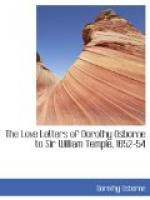I stand in awe of my brother. No, I fear nobody’s
anger. I am proof against all violence; but when
people haunt me with reasoning and entreaties, when
they look sadly and pretend kindness, when they beg
upon that score, ’tis a strange pain to me to
deny. When he rants and renounces me, I can despise
him; but when he asks my pardon, with tears pleads
to me the long and constant friendship between us,
and calls heaven to witness that nothing upon earth
is dear to him in comparison of me, then, I confess,
I feel a stronger unquietness within me, and I would
do anything to evade his importunity. Nothing
is so great a violence to me as that which moves my
compassion. I can resist with ease any sort of
people but beggars. If this be a fault in me,
’tis at least a well-natured one; and therefore
I hope you will forgive it me, you that can forgive
me anything, you say, and be displeased with nothing
whilst I love you; may I never be pleased with anything
when I do not. Yet I could beat you for writing
this last strange letter; was there ever anything
said like? If I had but a vanity that the world
should admire me, I would not care what they talked
of me. In earnest, I believe there is nobody
displeased that people speak well of them, and reputation
is esteemed by all of much greater value than life
itself. Yet let me tell you soberly, that with
all my vanity I could be very well contented nobody
should blame me or any action of mine, to quit all
my part of the praises and admiration of the world;
and if I might be allowed to choose, my happiest part
of it should consist in concealment, there should
not be above two persons in the world know that there
was such a one in it as your faithful.
Stay! I have not done yet. Here’s
another good side, I find; here, then, I’ll
tell you that I am not angry for all this. No,
I allow it to your ill-humour, and that to the crosses
that have been common to us; but now that is cleared
up, I should expect you should say finer things to
me. Yet take heed of being like my neighbour’s
servant, he is so transported to find no rubs in his
way that he knows not whether he stands on his head
or his feet. ’Tis the most troublesome,
busy talking little thing that ever was born; his
tongue goes like the clack of a mill, but to much
less purpose, though if it were all oracle, my head
would ache to hear that perpetual noise. I admire
at her patience and her resolution that can laugh
at his fooleries and love his fortune. You would
wonder to see how tired she is with his impertinences,
and yet how pleased to think she shall have a great
estate with him. But this is the world, and she
makes a part of it betimes. Two or three great
glistening jewels have bribed her to wink at all his
faults, and she hears him as unmoved and unconcerned
as if another were to marry him.
What think you, have I not done fair for once, would
you wish a longer letter? See how kind I grow
at parting; who would not go into Ireland to have
such another? In earnest now, go as soon as you
can, ’twill be the better, I think, who am your
faithful friend.




